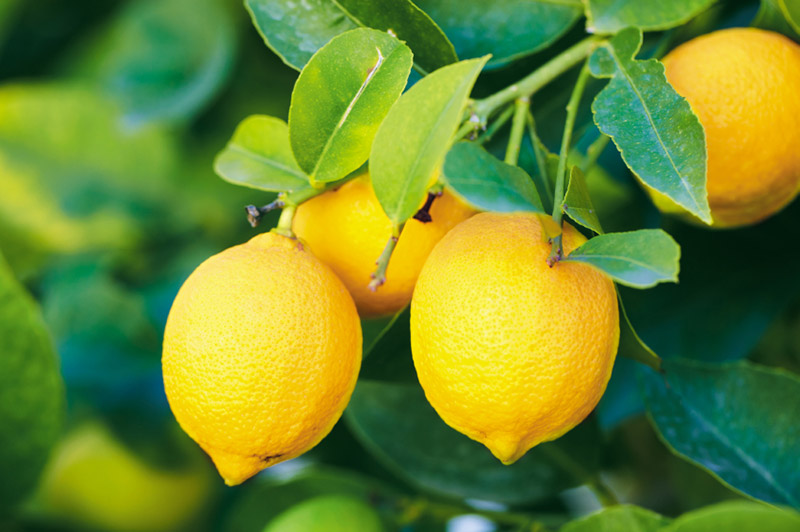 Lemons are thought to have first grown in India, Burma and China originating from a hybrid between a sour orange and a citron. Known to the Jews of Jerusalem in 90BC, they entered Europe in southern Italy in 1C AD, in the time of ancient Rome and only introduced into Persian, Iraq and Egypt as late as 700 AD and spread though the Mediterranean and Arab world between 1000-1150 AD with substantial cultivation by 15C. Christopher Columbus brought the seeds to the Caribbean, spreading them throughout the new world and they were increasingly planted in California and Florida by 19C.
Lemons are thought to have first grown in India, Burma and China originating from a hybrid between a sour orange and a citron. Known to the Jews of Jerusalem in 90BC, they entered Europe in southern Italy in 1C AD, in the time of ancient Rome and only introduced into Persian, Iraq and Egypt as late as 700 AD and spread though the Mediterranean and Arab world between 1000-1150 AD with substantial cultivation by 15C. Christopher Columbus brought the seeds to the Caribbean, spreading them throughout the new world and they were increasingly planted in California and Florida by 19C.
Nutritional Value
Their nutritional value was first recognised in 1747, when James Lind, a Scottish naval physician conducted the first clinical trial based on the theory that citrus fruits cured scurvy. Lemon juice added to the diets of seamen cured scurvy, though vitamin C was not known about at this time.
Nutritional Content
Lemons are largely water, with some protein and fibre and small amounts of carbohydrates, sugars and fats.
Vitamins: Rich in vitamin C, with some vitamin A and folates and traces of vitamins B1, B2, B3, B6, E.
Minerals: Rich in potassium, phosphorus, calcium and magnesium with traces of iron, sodium and zinc.
Flavones: These are the predominant flavonoids in lemons. The fruit is high in hesperidin and eriocitrin and also contains narirutin, naringin and didymin; the peel is rich in tangeritin.
Antioxidants
Many of the benefits of lemons are attributed to antioxidant compounds they contain called polyphenols, which include phenolic acids, flavonoids, and lignans. There are many subcategories and names you may have heard of relating to these.
Lignans are phytoestrogens, or estrogen-like chemicals that bind to estrogen receptors and are thought to interfere with cancer promoting effects. Isoflavones are also phytoestrogens.
Flavonoids or bioflavonoids are yellow in colour and are thought to act as chemical messengers. They can be categorised as flavones, isoflavonoids and neoflavonoids. Flavonoids, especially the catechins are the most common polyphenolic compounds in our diet, as are flavonoids such as quercitin in lesser quantities.
Potential Health Benefits, Science
The flavonoids in lemons and in the peel have been shown to give protection in many aspects of health.
Anti-cancer, anti-inflammatory, anti-microbial, anti-oxidant, anti-viral
Allergies: Inhibitory effect on histamine release in allergic reaction in rats; may be useful in alleviating the nasal symptoms of allergic rhinitis.
Bones: Protects bones via anti-Inflammatory and antioxidant properties; also dental periodontal issues. Preserved collagen, inhibited demineralization and enhanced remineralisation even under a fluoride-free condition.
Cholesterol: Lowering properties
Diabetes: Flavonoids suppressed the oxidative stress in diabetic rats and may also be potentially useful for the prevention and progression of hyperglycemia and insulin resistance. Also thought to be useful against obesity and promote carbohydrate metabolism.
Heart: Protective of cardio and atherosclerosis, reduces blood stickiness; raw juice decreased blood pressure.
Immune System: Modulator
Nervous System: Antidepressant-like, altered behaviour in mice; neuro-chemical and neuro-endocrine effects. Protective of neuro-degenerative disorders like Alzheimer’s, Parkinson’s, Senile Dementia.
Oxidative Stress: Prevention of oxidative damages caused by acute exercise-induced oxidative stress in rats. Modulating the oxidative stress and inflammatory responses.
Caution: Tangeritin may counteract the anticancer drug tamoxifen and suppress the activity of natural killer cells.
Including in your Diet: Be sure to use both the juice and the rind of the lemon.
We are happy to advise you on your health matters.
Lin Bridgeford DO KFRP MSCC ICAK (UK) MSc
Registered Osteopath & Kinesiologist & Yoga Teacher
Aether Bios Clinic
Saltdean Brighton
01273 309557
07710 227038
